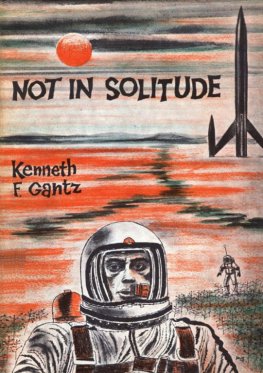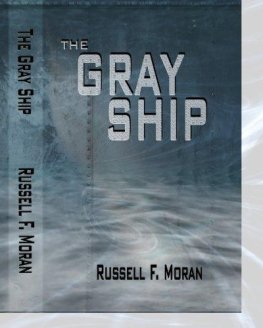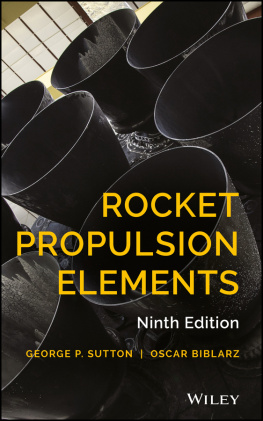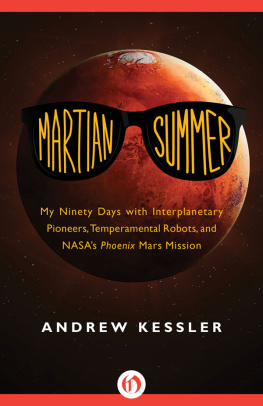Kenneth F. Gantz
NOT IN SOLITUDE
[Revised Edition]
THE RADAR alert buzzer snarled softly in the confined observation deck. Its periodic alto grunting was tuned low, but after a night and a day of waiting, it had the shocking effect of steam on a raw burn.
Neglecting his discarded heavy footgear, Dane got up from the chart table and went light-bodied to the observation ports. The night already crowded black against the guard-lighted sand a hundred feet below. Except in the east where the spark fires danced.
A dazzling finger of light stabbed suddenly from the space craft into the northeast. It probed delicately in azimuth at long range, paling the sweeping patrol beam that swung periodically around a lower horizon in obedience to the one-minute rotation of its mounting. Dane stared through the wide glassite port.
Binoculars, he thought, and turned away to reach for his case. He looked at Airman First Class Humphries, intent upon the auxiliary radar screen. What do you read? he demanded, excitement bubbling in his voice.
Humphries shook his head. Blank here.
Before Dane had his glasses in focus, the outlancing strike of light was cut off, knife sharp. The buzzer sounded again briefly, and was still.
More dust puffs, I reckon, Humphries said.
The disappointment tasted sour. The revolving patrol beacon swept by again; but light or dark, there was nothing outside to see except the crazy static discharges over the lichen beds. Nothing anywhere but the lichens and the damned red dust of Mars that the big spacecraft sat upon, a huge ball of a sphere atop rigid metallic skirts belling out like a sawed-off cone against the supporting dust below.
Dane glanced at the clock, twisting his chin against his shoulder to look up. Maybe a civilian just didnt understand. But only the United States Air Force would mount a clock face down at the peak of an overhead dome. Every uniformed manjack in the spacecraft wore a watch at his wrist as meticulously time-ticked as a chronometerand nearly as costly in its manufacture. Yet the Air Force thought it important that you could get the time at an upcocked eye from any post on the igloo-shaped observation deck of the Far Venture. A better name in itself than they foresaw, Dane thought grimly. A man could find a grave easily enough in his own native dust of Earth. He turned impatiently. From whatever angle you looked at that stupid clock, Dr. Pembroke had now been outside without a word for 24 hours.
Dane would have been ready enough to go home. He could agree on that with the entire crew and all the scientific party cooped up in the spacecraft against the planetary radiation. On that one thing at least, he would agree with Colonel Craggexcept for Dr. Pembroke. Even without the radiation.
You going to take some more pictures up here before we take off? Humphries asked.
Humphries was a small-talker. The equipment is making them now, Dane answered shortly. Two a minute. He went to the photo plane table and pretended to check the smoothly clicking recording camera.
Humphries said, I dont mean them. You going to take any more pictures up here, I wish youd get me in on one and maybe get it printed in the papers when we get back.
Im also supposed to be the assistant physicist, Dane said. Two jobs dont give you much time for extras, especially when on one of them youre working for Amalgamated Press and on the other for Dr. Pembroke.
I got a girl in Richmond I can use a little help with.
Ill tell you what, Dane said, maybe tomorrow Ill get a chance to shoot you.
I got competition. The roly-poly face frowned thought-fully over the slender love link. Plenty of competition.
Dane let him ramble. He was as fidgety as a shut-up cat himself. After a bit he found himself gazing distastefully at the big ash tray littered with his half-smoked butts. His hand shot out to seize it, and before he could check the motion, he slammed it hard against the up-curving shell of the chamber.
Hell! he said. Damn-it-to-hell!
Humphries swiveled around on his stool. Whats the matter, Doc? He studied the mess on the deck plates.
Whos in command here? Dane demanded.
Huh? Humphries jaw loosened.
If Colonel Cragg is in command, what can I do? Or anyone else after he makes up his mind. Like a little tin god in a big tin can!
Humphries looked over his shoulder at the intercom. He said, Doc, you ought to get some rest. You cant keep going on two, three hours sleep.
You want a picture to impress your girlfriend. Colonel Cragg wants a bigger picture. The Far Venture lands on Earth. All hail the great captain. So Dr. Pembroke and three men are left behind, the show goes on and all that.
Its tough, Humphries said. I already read them for dead ever since they dont answer no more on the radio.
Theyre not dead, Dane said bitterly. Except that Colonel Cragg says theyre dead. That makes them officially dead. As good as dead.
Humphries shook his head. You maybe ought to keep shut up. No use getting yourself in a jam with the colonel. Besides, what you going to do about it?
Im not wearing a uniform myself, Dane said. But youre right about one thing. What am I going to do about it?
Just take it easy, Humphries said. Just take it easy and roll with the punches. He nodded wisely. What the colonel decides is going to be, anyway.
God damn Colonel Cragg! He was like an aging football player. Thick in the neck and thick in the head, with eyes that looked only straight to the front. Bull Cragg they called him in the United States Air Force. You might as well try to get him concerned about an unresolved chord as about a human matter outside his line of duty. He moved in larger orbits.
The flash bulletin out of Washington had not been unexpected at Amalgamated. WAR HERO TO COMMAND FIRST FLIGHT TO MARS! Cragg had his admirers in the Pentagon, all right, and his carefully tended contacts with influence even in higher places. To honor a popular figure, the War Chief had passed over not only Air General Cluett, commander of the first moon flight back in 2010, but even younger Air Force brilliants like Major Noel, the inventor of the sensational spectrum-beacon Automatic Interspatial Navigation Control. Before the rest of the make-ready was over, it was apparent that Cragg was personally committed not to a scientific expedition but to a military reconnaissance. So much for Dr. Pembroke, Director of Science for Expedition Mars. Director? Certainly. To the extent that suited Colonel Cragg.
Dane went back to his port and stared out at Mars, visible in the east by the flaring spark fires.
The most Earth-like of the solar planets, a distinguished astrophysicist had pronounced it, yet structurally the opposite of Earth. A homogeneous sphere, he said, a nearly uniform mixture of silicate and metallic iron-nickel, with no core of iron like that of Earth. A physically alien world, more like the moon than the lush habitation that man calls home.
A monotonous sphere of reddish dust, the great astronomical observers had portrayed it, unrelieved except for eroded hills worn down by long-gone floods, flecked at the poles by a thin frost, stained widely by a green discoloration, possible vegetative.
With an atmosphere as rare as Earths at eleven miles high, with no detectable trace of free oxygen, a classic astrobiologist had written of it, one must concede that the vegetation apparently comprising the green areas is on the low order of the lichen or the liverwort, if indeed it should parallel in any way the growing things of Earth. But, he had summed up, life at such a disappointing level is not what men would seek when the time arrived for their first journey to their neighbors in space.
Yes and quite so. Neatly deduced and experimentally sound. But a man had to ride the decks of the Far Venture up the long slant to the splendid globe and see its particolors fade into a sky-filling dun and drab vastness, characterless and unwelcoming to man. Not till then was the lingering hope at last gone that perhaps here might be a home of warm blooded life and zest for living. Before the swooping exploratory encirclements had all been run and the spacecraft had settled on the nude red plain of Isidis Regio five miles west of the vast Syrtis Major lichen beds, Dane had known that one man, at least, doubted the adventure.












